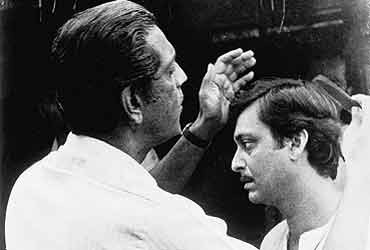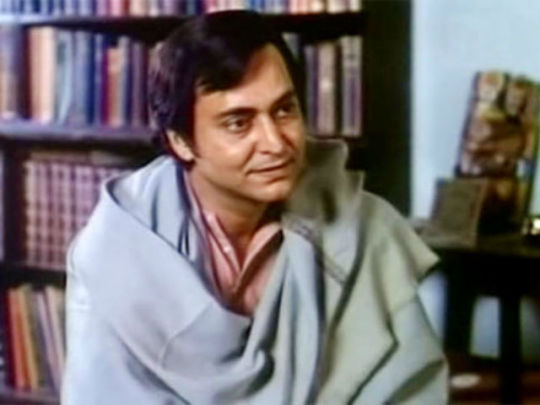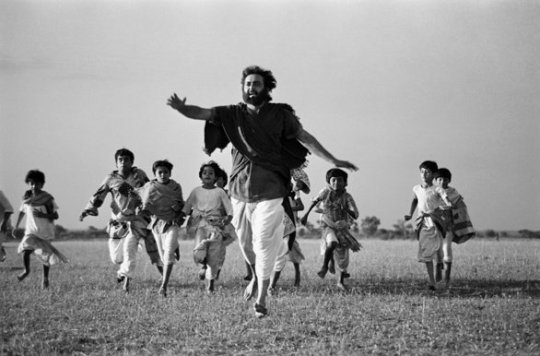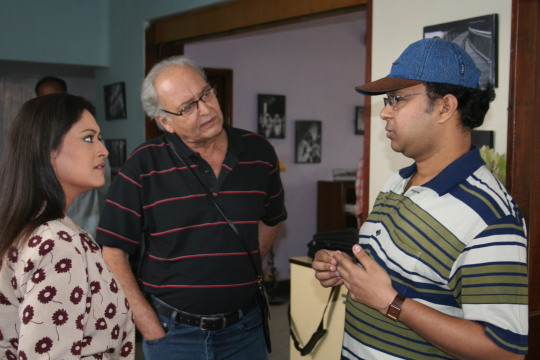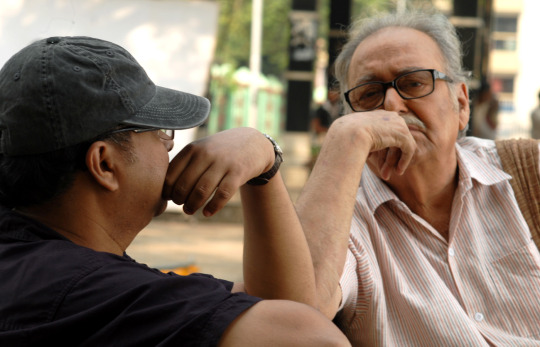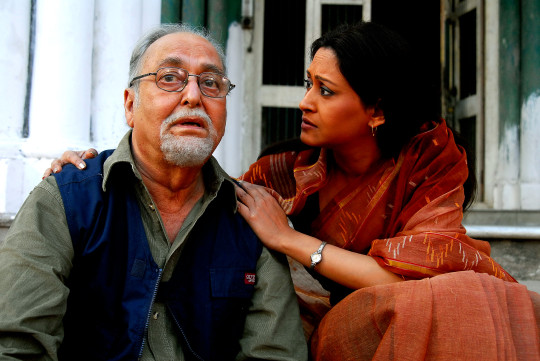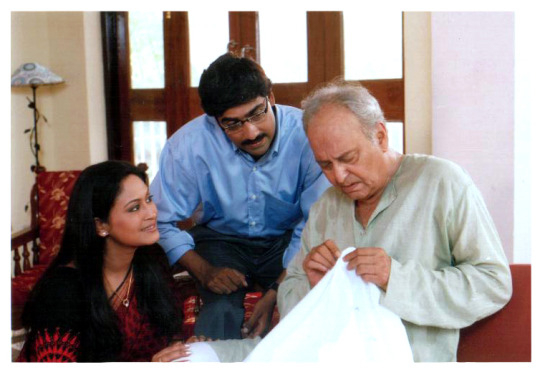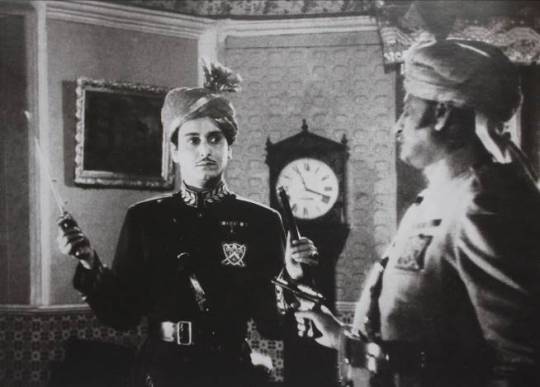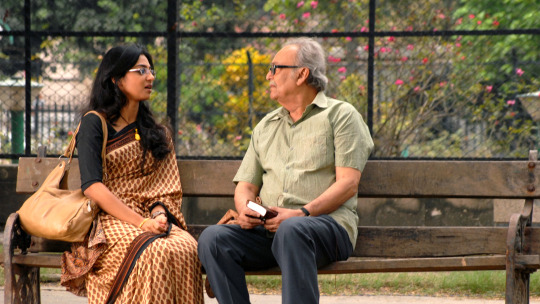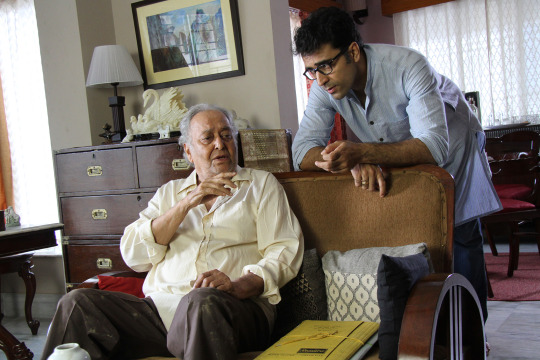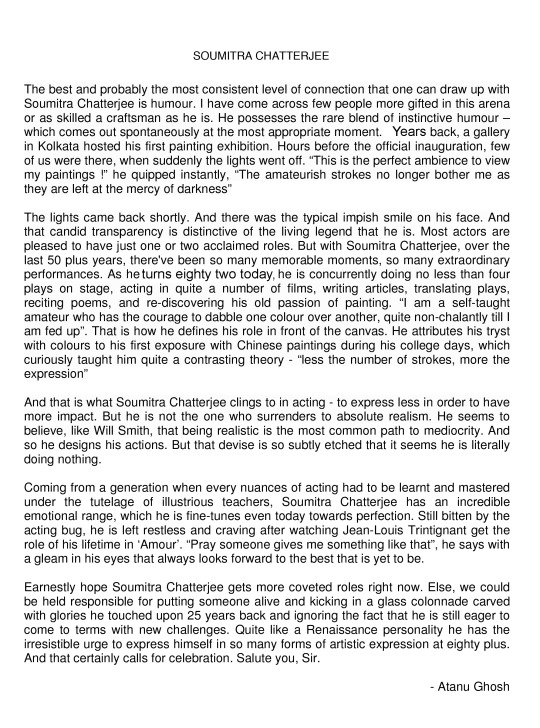Text
ঠিক যেন রূপকথা
- By Saswata Barman
…And the Winner is “Rupkatha (রূপকথা)”, announces the anchor!! [Applauses all around the BFI theatre]
Sugato’s first Bengali film has won the ‘Best Foreign Film’ award in the British Film Institute [BFI] International Festival! Amongst the rousing applause, Sugato’s mind wanders away to Kolkata, his Grand-parents’ home, the streets of Kolkata, Rabindra Sarobar, the park, lake, that conversation…… He wonders whether that was a dream or this is!!
[Almost a year back]
Sugato is not enjoying his work anymore. He has delivered many projects year-on- year for 10 years now but this is getting monotonous. He has shared this with his manager who has advised him to take a break. Sugato decides to visit his Grandparents in Kolkata, where he spent the first few of his growing years. Sugato’s Grandfather was an Engineer with the Public Works Department and since his retirement has been engaged in multiple activities including running an amateur club on short film making. His Grandmother is a retired School Principal and he remembers how she introduced him to the world of books – fiction, travelogue, puzzles and what not. Sugato’s Grandparents live near Rabindra Sarobar. He still remembers when he used to go to the lakeside for a walk with his Grandfather and spot the migratory birds!
[Day 7 of Sugato’s trip]
Since he came here in Kolkata, Sugato has spent the entire week catching up with his relatives, childhood friends from the school before his father shifted to London. Today, after waking up in the morning, he thought he needs to relax at home only and what better than reading some books from his Grandmother’s mini library in the third floor! After having breakfast, he walked up to the third floor where all the books are stored in a room in huge bookshelves alongside the walls. There is an arm chair in the middle of the room. Sugato picked a couple of books on Bengali Cinema and started reading. “Wow”, he thought to himself, “I should have read more about this as - Cinema is the reflection of the society and its times”. He kept reading and got completely hooked on to the book…….
There was a noise from downstairs; his Grandfather was going to the lakeside for a stroll and was asking if Sugato wants to join as well. Sugato replied back “আসছি … আমিও যাব”. Sugato’s Grandfather was a strict disciplinarian and asked him to get ready and join him in the lake side near the ঠাকুরদের Gallery.
Sugato reaches the lakeside and can not find his Grandfather. He walks up to the lake and sits on a vacant bench by its side. The childhood strolls around the lake started floating in front of his eyes. He was replaying his childhood and deep into his thoughts.
Suddenly, there was a voice “আমি কি এখানে বসতে পারি?”. Sugato turns his head around and sees this elderly man, probably an octogenarian like his Grandfather.
He says “হ্যাঁ অবশ্যই”.
Elderly Man – “Where do you live?”
Sugato – “I live near the Menoka cinema. Well actually it is where my দাদু and ঠাকুরমা lives. I live in London and have come to visit them.”
Elderly Man – “Oh I see. [pauses for a moment] If you do not mind, what is your grandfather’s name?”
Sugato – “His name is Apurbo Chakraborty. He was a Chief Engineer in the P….” [The Elderly man starts speaking]
Elderly Man – “I know Apurbo very well. He runs this Club for Short film making and I am a big fan of his club. He has inspired so many people to get into film making. I wish we had more people like him” [sighs]
Sugato – “Are you a member of that club as well?”
Elderly Man – [Looks at him] “No I am not, but I have visited his workshop once. I, however appreciate his efforts a lot. It is high time that people start nourishing the rich heritage of Bengali film-making and take it to newer heights!”
Sugato – “It’s a coincidence that I was reading the History of Bengali Cinema collected from the Archive of the Centre for Studies in Social Sciences, this afternoon.”
Elderly Man – “Do you want to know about the beginning of the industry – the Tolly industry as they say these days?”
Sugato - [Sounds excited] “Yes sure! That will be my pleasure.”
Elderly Man – “Bengali cinema had its presence in the last decade of the 19th century. The first cinema shows in Bengal date back to 1896-7. This was around the time when Lumiere Brothers’ Cinematographe in Bombay did the first Cinema show in July 1896. Hiralal Sen of Royal Bioscope company in Calcutta started making short films from around 1900. Cinema in Bengal around that time revolved mostly around the silent films and slowly the talkies were evolving. They were very much at par, if not better than the films being made in Bombay. Over the years, the gap increased in favour of the Bombay industry but Bengal has gifted India and the world some of the finest actors and directors.”
Sugato – “Wow, so which was the first Bengali film?”
Elderly Man – “The first Bengali-language film was the silent feature Billwamangal, produced by the Madan Theatre Company of Calcutta. This was based on the play written by Urdu playwright Agha Hashr Kashmiri. The movie released in November 1919, six years after the first full-length Indian feature film, Raja Harish Chandra, was released. The first Bengali talkies Jamai Shashti, however released on 11th April 1931 at Crown Cinema Hall in Calcutta as a short movie. The first Bengali talkies as a full-length feature film was, Dena Paona, which released on 30th December 1931 at Chitra Cinema Hall in Calcutta. Madan Theatre was a giant film corporation in Calcutta. It was the numero-uno in silent film distribution and many cinema theatres across the subcontinent. Then came Birendranath Sircar’s New Theatres Ltd., established in 1930 and went on to make landmark films in Bengal and Indian film industry like Pramatesh Barua’s Debdas in1935 and Mukti in 1937, Nitin Bose’s President in 1937, to name a few. The studio created star singers like Kananbala and K.L. Saigal.
I hope you are not getting bored?” [Asked the man to Sugato]
Sugato – “No, Not at all. Please carry on.”
Elderly Man – “New Theatres also gave us acting stars like Pahari Sanyal who became well known for their character roles upto the 50’s. The New Theatre also started the practice of remakes in those days as they started double versions of its films, in Bengali and Hindi-Urdu. This gave them a Pan-India market and reach. Another well-known director who was a product of New Theatres was Bimal Roy, a renowned Director in the 50’s who made films like Udayer Pathe that went on to be remade into one of the most popular Hindi films – Humrahi. The 1950’s also gave Bengali cinema two if its biggest stars of all times – Uttam Kumar and Suchitra Sen. The golden years of the 50’s also saw an important film being made that was celebrated much later. Satyajit Ray’s Pather Panchali which released in 1955 and won “Best Human Document” at the 1956 Cannes Film Festival. He went onto make a trilogy and Apur Sansar, the third film of Ray’s Apu trilogy, which had a ‘silver jubilee’ in Calcutta. Apur Sansar introduced Soumitra Chatterjee, who along with Uttam Kumar became Bengali cinema’s top male star and continues to inspire through his movies and theatre shows till today.”
Sugato – “I have heard my grandpa speak about Mrinal Sen….”
Elderly Man – “Yes there was him and Ritwick Ghatak, both Satyajit Ray’s contemporary. Ritwick Ghatak introduced a brand new form of Bengali cinema, that made political statements of their times. Mrinal Sen carried forward the picturisation of social unrest and radical politics of his times. Sen’s Akaler Sandhane in which a film crew recreates the 1943 Bengal famine, won the Silver Bear at Berlin in 1981. Satyajit Ray received an Oscar for his lifetime’s work days before his death in 1992, marking the end of an era. The ‘90s also saw the rise of a Director- Rituparno Ghosh. His films resulted in the Bengali middle class returning to movie halls. In the last 10 years or so, film making has become much matured in Bengal. Directors like Srijit Mukherjee, Atanu Ghosh, Kamaleshwar Mukherjee and many others are making their own brand of movies. But still, there is a lot to be done….”
Sugato – “A lot to be done? What do you mean?”
Elderly Man – “Bengali cinema has lot to offer to the world. The language of cinema is universal and its high time good Bengali films reach to the world audience. Bengalis in general like quality cinema with good storylines but at the same time Bengali film makers sometimes underplay their brilliant work. There should be a common endeavour in this industry to take strength from its glorious history and take the next step forward to make Bengali movies a global phenomenon”
[A voice is heard from an elderly woman]
“Sugato wake up now, it’s time for lunch; take your bath and come down, your Grandpa has returned from his stroll as well”
Sugato stares at the door and hears his Grandpa say “Why did not he come to the lake side as he said…..?”. He looks down at the book in his hands. He has almost finished the book and is on a page that says “50’s – 70’s - the era of Satyajit Ray”……
Sugato has made up his mind. He wants to make a Bengali film and take it to the global audience. He will ever remain indebted to the man, who had this inspiring conversation with him. He said to himself – “ঠিক যেন রূপকথা”!
N.B:
The endeavor to take Bengali Cinema to the Global audience is a reality unlike the fiction above. Storyline Movies was created in Dec 2016 by six Bengalis coming from different walks of life. Led by Acclaimed Director Atanu Ghosh of Abby Sen, Angshumaner Chobi’s fame, the aim of the production house is to make Bengali movies with quality storylines and release them in different languages worldwide. Our first venture is 72 Ghanta directed by Atanu Ghosh and includes actors like Soumitra Chatterjee, Abir Chatterjee, Paran Bandopadhyay, Indrani Halder and many more. To know more and help us with this endeavor please connect with us @
Like our Facebook page – https://www.facebook.com/storylinemovies
Follow us on Twitter - @storylinemovies
Website – http://www.storylinemovies.com
Source of Reference on History of Bengali Cinema - Bengali Cinema: 'An Other Nation' by Sharmishtha Gooptu; published by Routledge.
0 notes
Text
Top 10 Soumitra Chatterjee movies selected by the Legend himself!
Ever wondered which movies are the top 10 favourites of his own films of Soumitra Chatterjee - the legend himself ? See below * Apur Sansar Jhinder Bandi Charulata Aranyer Din Ratri Sonar Kella Sangsar Simante Wheelchair Kony Dekha Rupkatha Noy To get more updates like this subscribe by liking our facebook page - https://www.facebook.com/storylinemovies *He chalked out this list for a retrospective last year
0 notes
Text
Did You Know?
The first Bengali-language movie was the silent feature Billwamangal, produced by the Madan Theatre Company of Calcutta. The movie released in November 1919, six years after the first full-length Indian feature film, Raja Harish Chandra, was released!
1 note
·
View note
Text
Did You Know?
The first Bengali talkies Jamai Shashthi released on 11th April 1931 at Crown Cinema Hall in Calcutta as a short movie. The first Bengali talkies as a full-length feature film was, Dena Paona, which released on 30th December 1931 at Chitra Cinema Hall in Calcutta!
1 note
·
View note
Text
Welcome
Hi, this is Storyline Movies - a new Production house in Kolkata. We are a team of six from various walks of life! Our aim is to make Bengali movies with quality storylines and take it to the global audience. We believe in quality storytelling. Our first venture is 72 Ghanta - a movie consisting of 6 stories interwoven with each other. It is being directed by Atanu Ghosh of Abby Sen, Rupkatha noy, Angshumaner Chobi fame.
1 note
·
View note
